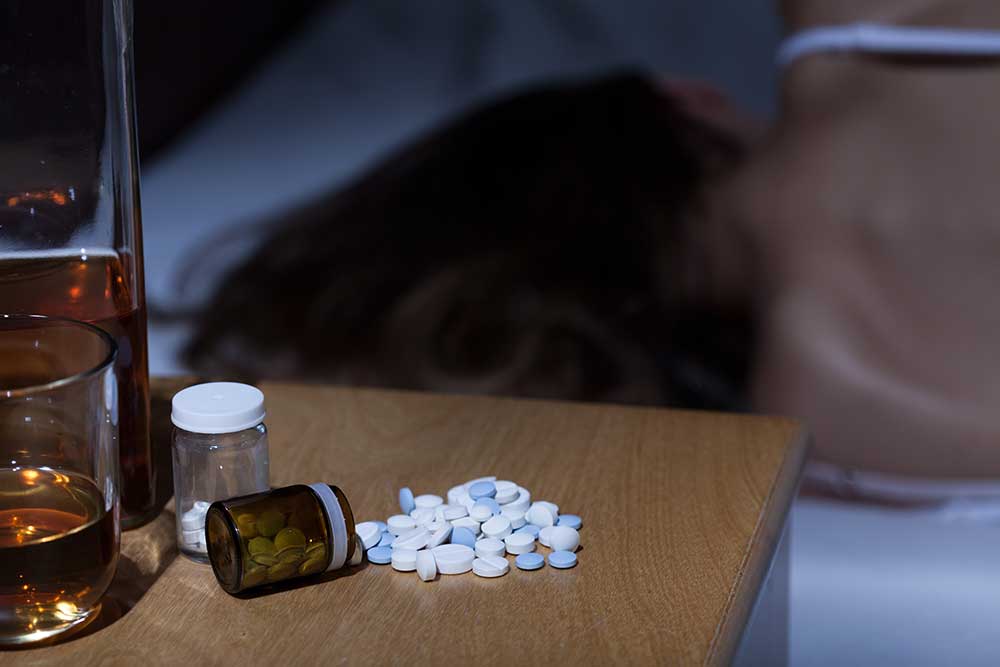Harmful Side Effects of Mixing Sleeping Pills with Alcohol
When sleep eludes you, taking a prescription or over-the-counter sleeping pill can be “just what the doctor ordered” to get relief … it can also be dangerous. Discover why here:

Over-the-Counter and Prescription Sleep Aids – Rates of Use and Misuse
Nearly one in two Americans has experienced symptoms of insomnia (such as trouble falling or staying asleep or getting sufficient rest), according to some experts’ estimates. Many of these same Americans turn to pharmacological sleep aids, whether over-the-counter or doctor-prescribed, for help with their sleep problems:
- 10 to 20 percent of Americans take over-the-counter sleep aids each year, according to the American Academy of Sleep Medicine.
- As many as 30 percent of American women reportedly use some kind of sleep aid each week.
- 4 percent of Americans were prescribed a sedative or hypnotic medication for sleep within the previous month, and prescriptions for sleep aids have tripled among Americans between the ages of 18 and 24, according to 2013 findings by the Centers for Disease Control and Prevention (CDC).
Even when taken occasionally and as directed, these sleep medications can have unpleasant and potentially serious side effects. What’s more troubling is that a “shocking” number of Americans reportedly misuse these pills, taking them far longer than intended or not as directed. Furthermore, a study by researchers at Brown University and the University of Rhode Island reportedly found that 60 percent of people taking prescription drugs that are not to be taken with alcohol (including certain sleep aids) do still drink.
Mixing sleeping pills with alcohol is in fact a relatively common form of misuse, according to findings by the Substance Abuse and Mental Health Services Administration (SAMHSA):
- Recently, the number of zolpidem-related emergency room visits—zolpidem is the active ingredient in Ambien and a number of other sleep aids—nearly doubled between the years 2005 and 2010. “Overmedication” (taking too much zolpidem or taking it in combination with alcohol and other drugs) was reportedly the cause of this dramatic uptick.
- 14 percent of all zolpidem-related emergency room visits involve alcohol alone in combination with zolpidem.
Health Dangers of Mixing Sleeping Pills With Alcohol
The health dangers of mixing mixing sleeping pills with alcohol and/or other prescription drugs are not to be underestimated: a study in the American Journal of Therapeutics found that taking alcohol mixed with zolpidem doubled people’s chances of ending up in an intensive care unit.
In some cases, alcohol and sleeping meds and/or other prescription drugs can be nothing short of deadly, as evidenced by a string of celebrity tragedies. (The singer Whitney Houston’s death reportedly involved alcohol in combination with Xanax. Others to suffer similar fates from alcohol in combination with prescription drugs have included Heath Ledger, Michael Jackson and Anna Nicole Smith.)
Alcohol and sleeping medications both affect the central nervous system and work on the same GABA receptors in the brain, so when taken together can intensify potentially harmful side effects. One of these is respiratory depression. Sedative and hypnotic medications for sleep cause breathing to slow down. When sleeping pills and alcohol are mixed, the effect can be more pronounced, with the result that breathing halts entirely and cardiac arrest ensues.
In addition to slowed or labored breathing, alcohol in combination with sleep medications can cause instances of unusual and potentially life-threatening behavior. For example, zolpidem medications like Ambien have been linked to episodes of driving in one’s sleep that have placed users and others directly in harm’s way. Some people have had sex while on zolpidem and then have not been able to remember the incident. Adding alcohol to the mix can raise the likelihood of these potentially dangerous, disassociative-like experiences.
Other adverse reactions from mixing sleeping pills with alcohol can include:
- Intensified drowsiness and sleepiness
- Impaired motor functioning
- Memory impairment
Commonly Used Sleeping Pills With Interactions to Alcohol
In addition to sleep medications containing zolpidem, a number of other sleeping aids are known to have interactions with alcohol. They include but are not limited to these sleep drugs listed by the National Institute on Alcohol Abuse and Alcoholism:
- Lunesta
- Prosom
- Restoril
- Sominex
- Unisom
- Certain herbal supplements (valerian, chamomile, lavender)
Harmful Side Effects of Mixing Sleeping Pills with Alcohol – Who Is More at Risk
Women and the elderly are generally more at risk of experiencing the harmful side effects of alcohol mixed with sleep medications. One reason for this higher vulnerability is that women and the elderly are more likely to use prescription or over-the- counter medicine for help with insomnia. Another reason is that women and the elderly tend to metabolize substances more slowly.
Getting Help
On their own, zolpidem and other sleeping medications can be habit-forming and can cause negative health repercussions—but taking sleeping pills with alcohol is very risky. Doing so on a more regular basis may indicate the presence of a substance abuse problem. The best way to get help is to consult an addiction professional about these concerns.

